Exploring Challenges & Opportunities in Post Carbon Ireland Peak Oil
VerifiedAdded on 2023/06/04
|5
|769
|258
Essay
AI Summary
This essay explores the challenges and opportunities for Ireland in transitioning to a post-carbon economy amidst the era of peak oil. It highlights Ireland's historical dependence on imported oil and the need to reduce reliance on fossil fuels. The essay discusses Ireland's shift towards renewable energy sources like wind, tidal, and wave energy, as well as the potential development of nuclear energy. While peak oil presents challenges such as potential fuel price surges and increased food prices, it also opens avenues for alternative energy sources and reduced greenhouse gas emissions. The analysis includes data on Ireland's industrial energy consumption, CO2 emissions, and references key reports and studies related to energy policy and sustainability.
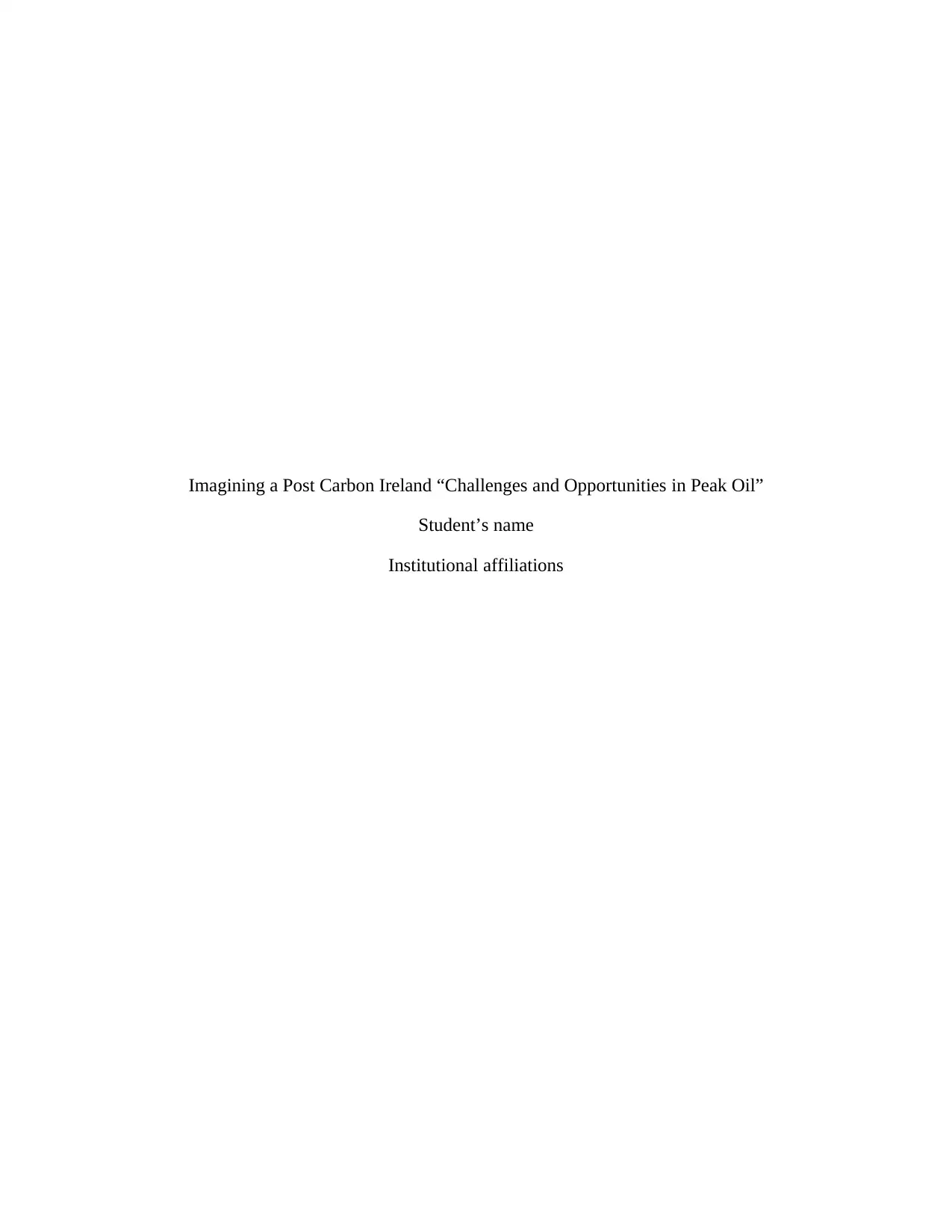
Imagining a Post Carbon Ireland “Challenges and Opportunities in Peak Oil”
Student’s name
Institutional affiliations
Student’s name
Institutional affiliations
Paraphrase This Document
Need a fresh take? Get an instant paraphrase of this document with our AI Paraphraser
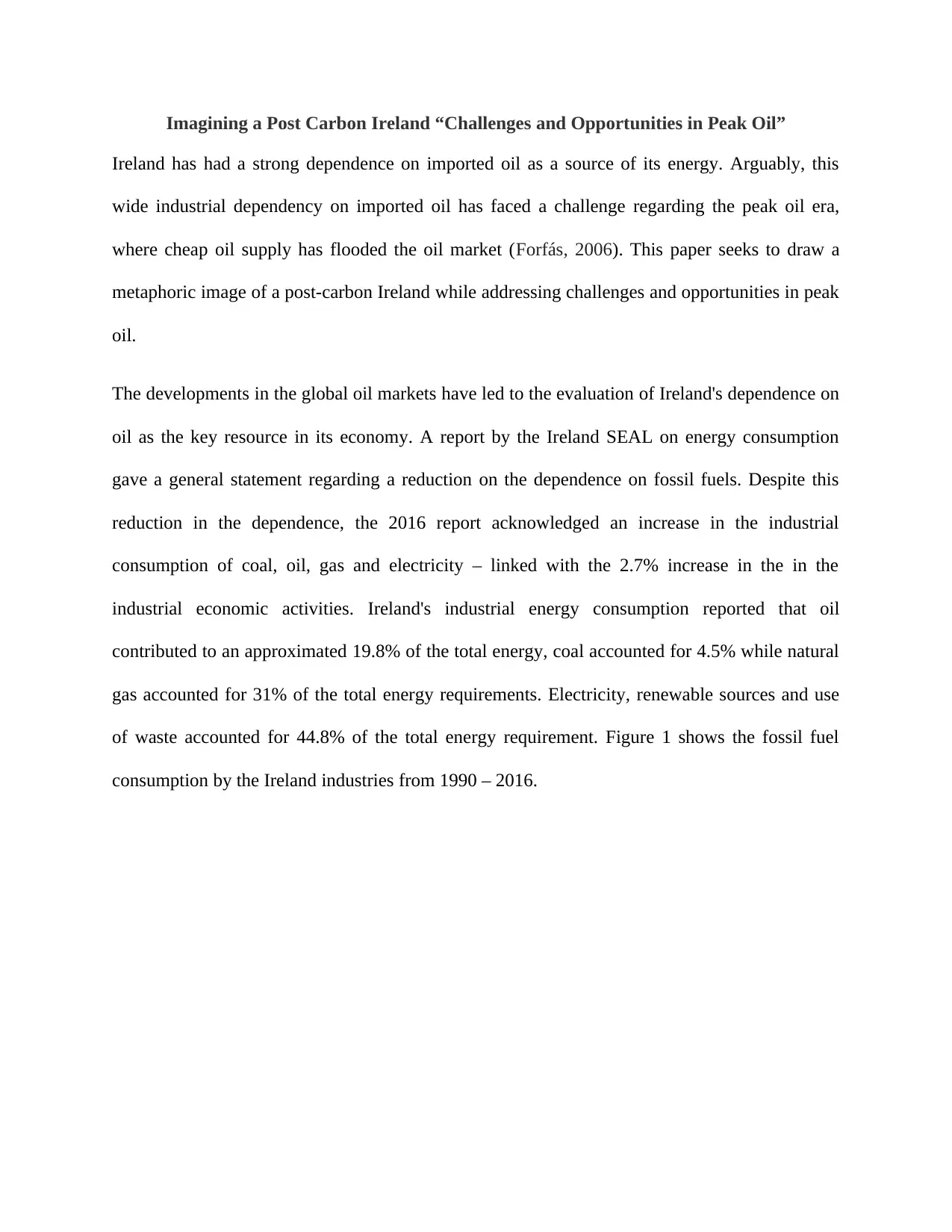
Imagining a Post Carbon Ireland “Challenges and Opportunities in Peak Oil”
Ireland has had a strong dependence on imported oil as a source of its energy. Arguably, this
wide industrial dependency on imported oil has faced a challenge regarding the peak oil era,
where cheap oil supply has flooded the oil market (Forfás, 2006). This paper seeks to draw a
metaphoric image of a post-carbon Ireland while addressing challenges and opportunities in peak
oil.
The developments in the global oil markets have led to the evaluation of Ireland's dependence on
oil as the key resource in its economy. A report by the Ireland SEAL on energy consumption
gave a general statement regarding a reduction on the dependence on fossil fuels. Despite this
reduction in the dependence, the 2016 report acknowledged an increase in the industrial
consumption of coal, oil, gas and electricity – linked with the 2.7% increase in the in the
industrial economic activities. Ireland's industrial energy consumption reported that oil
contributed to an approximated 19.8% of the total energy, coal accounted for 4.5% while natural
gas accounted for 31% of the total energy requirements. Electricity, renewable sources and use
of waste accounted for 44.8% of the total energy requirement. Figure 1 shows the fossil fuel
consumption by the Ireland industries from 1990 – 2016.
Ireland has had a strong dependence on imported oil as a source of its energy. Arguably, this
wide industrial dependency on imported oil has faced a challenge regarding the peak oil era,
where cheap oil supply has flooded the oil market (Forfás, 2006). This paper seeks to draw a
metaphoric image of a post-carbon Ireland while addressing challenges and opportunities in peak
oil.
The developments in the global oil markets have led to the evaluation of Ireland's dependence on
oil as the key resource in its economy. A report by the Ireland SEAL on energy consumption
gave a general statement regarding a reduction on the dependence on fossil fuels. Despite this
reduction in the dependence, the 2016 report acknowledged an increase in the industrial
consumption of coal, oil, gas and electricity – linked with the 2.7% increase in the in the
industrial economic activities. Ireland's industrial energy consumption reported that oil
contributed to an approximated 19.8% of the total energy, coal accounted for 4.5% while natural
gas accounted for 31% of the total energy requirements. Electricity, renewable sources and use
of waste accounted for 44.8% of the total energy requirement. Figure 1 shows the fossil fuel
consumption by the Ireland industries from 1990 – 2016.
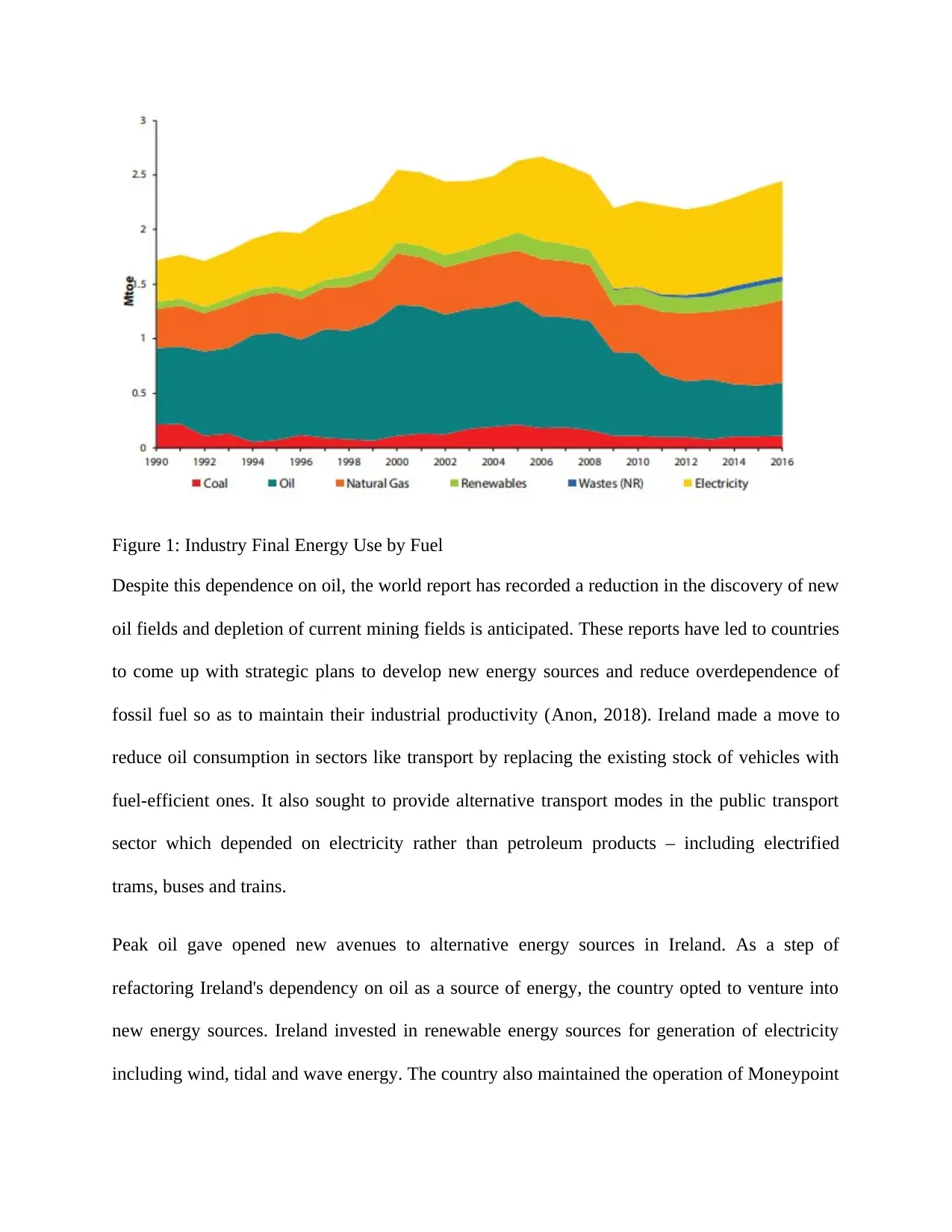
Figure 1: Industry Final Energy Use by Fuel
Despite this dependence on oil, the world report has recorded a reduction in the discovery of new
oil fields and depletion of current mining fields is anticipated. These reports have led to countries
to come up with strategic plans to develop new energy sources and reduce overdependence of
fossil fuel so as to maintain their industrial productivity (Anon, 2018). Ireland made a move to
reduce oil consumption in sectors like transport by replacing the existing stock of vehicles with
fuel-efficient ones. It also sought to provide alternative transport modes in the public transport
sector which depended on electricity rather than petroleum products – including electrified
trams, buses and trains.
Peak oil gave opened new avenues to alternative energy sources in Ireland. As a step of
refactoring Ireland's dependency on oil as a source of energy, the country opted to venture into
new energy sources. Ireland invested in renewable energy sources for generation of electricity
including wind, tidal and wave energy. The country also maintained the operation of Moneypoint
Despite this dependence on oil, the world report has recorded a reduction in the discovery of new
oil fields and depletion of current mining fields is anticipated. These reports have led to countries
to come up with strategic plans to develop new energy sources and reduce overdependence of
fossil fuel so as to maintain their industrial productivity (Anon, 2018). Ireland made a move to
reduce oil consumption in sectors like transport by replacing the existing stock of vehicles with
fuel-efficient ones. It also sought to provide alternative transport modes in the public transport
sector which depended on electricity rather than petroleum products – including electrified
trams, buses and trains.
Peak oil gave opened new avenues to alternative energy sources in Ireland. As a step of
refactoring Ireland's dependency on oil as a source of energy, the country opted to venture into
new energy sources. Ireland invested in renewable energy sources for generation of electricity
including wind, tidal and wave energy. The country also maintained the operation of Moneypoint
⊘ This is a preview!⊘
Do you want full access?
Subscribe today to unlock all pages.

Trusted by 1+ million students worldwide
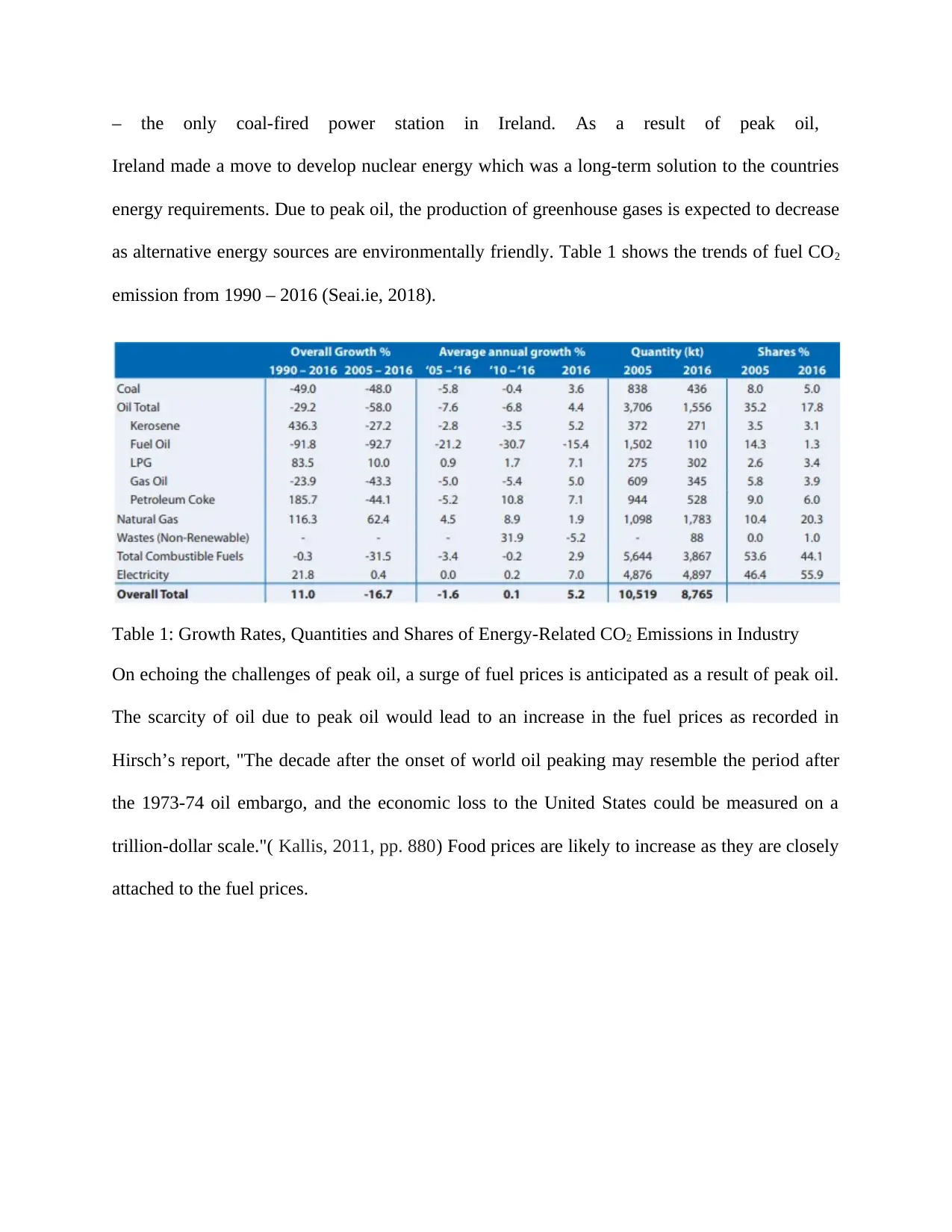
– the only coal-fired power station in Ireland. As a result of peak oil,
Ireland made a move to develop nuclear energy which was a long-term solution to the countries
energy requirements. Due to peak oil, the production of greenhouse gases is expected to decrease
as alternative energy sources are environmentally friendly. Table 1 shows the trends of fuel CO2
emission from 1990 – 2016 (Seai.ie, 2018).
Table 1: Growth Rates, Quantities and Shares of Energy-Related CO2 Emissions in Industry
On echoing the challenges of peak oil, a surge of fuel prices is anticipated as a result of peak oil.
The scarcity of oil due to peak oil would lead to an increase in the fuel prices as recorded in
Hirsch’s report, "The decade after the onset of world oil peaking may resemble the period after
the 1973-74 oil embargo, and the economic loss to the United States could be measured on a
trillion-dollar scale."( Kallis, 2011, pp. 880) Food prices are likely to increase as they are closely
attached to the fuel prices.
Ireland made a move to develop nuclear energy which was a long-term solution to the countries
energy requirements. Due to peak oil, the production of greenhouse gases is expected to decrease
as alternative energy sources are environmentally friendly. Table 1 shows the trends of fuel CO2
emission from 1990 – 2016 (Seai.ie, 2018).
Table 1: Growth Rates, Quantities and Shares of Energy-Related CO2 Emissions in Industry
On echoing the challenges of peak oil, a surge of fuel prices is anticipated as a result of peak oil.
The scarcity of oil due to peak oil would lead to an increase in the fuel prices as recorded in
Hirsch’s report, "The decade after the onset of world oil peaking may resemble the period after
the 1973-74 oil embargo, and the economic loss to the United States could be measured on a
trillion-dollar scale."( Kallis, 2011, pp. 880) Food prices are likely to increase as they are closely
attached to the fuel prices.
Paraphrase This Document
Need a fresh take? Get an instant paraphrase of this document with our AI Paraphraser
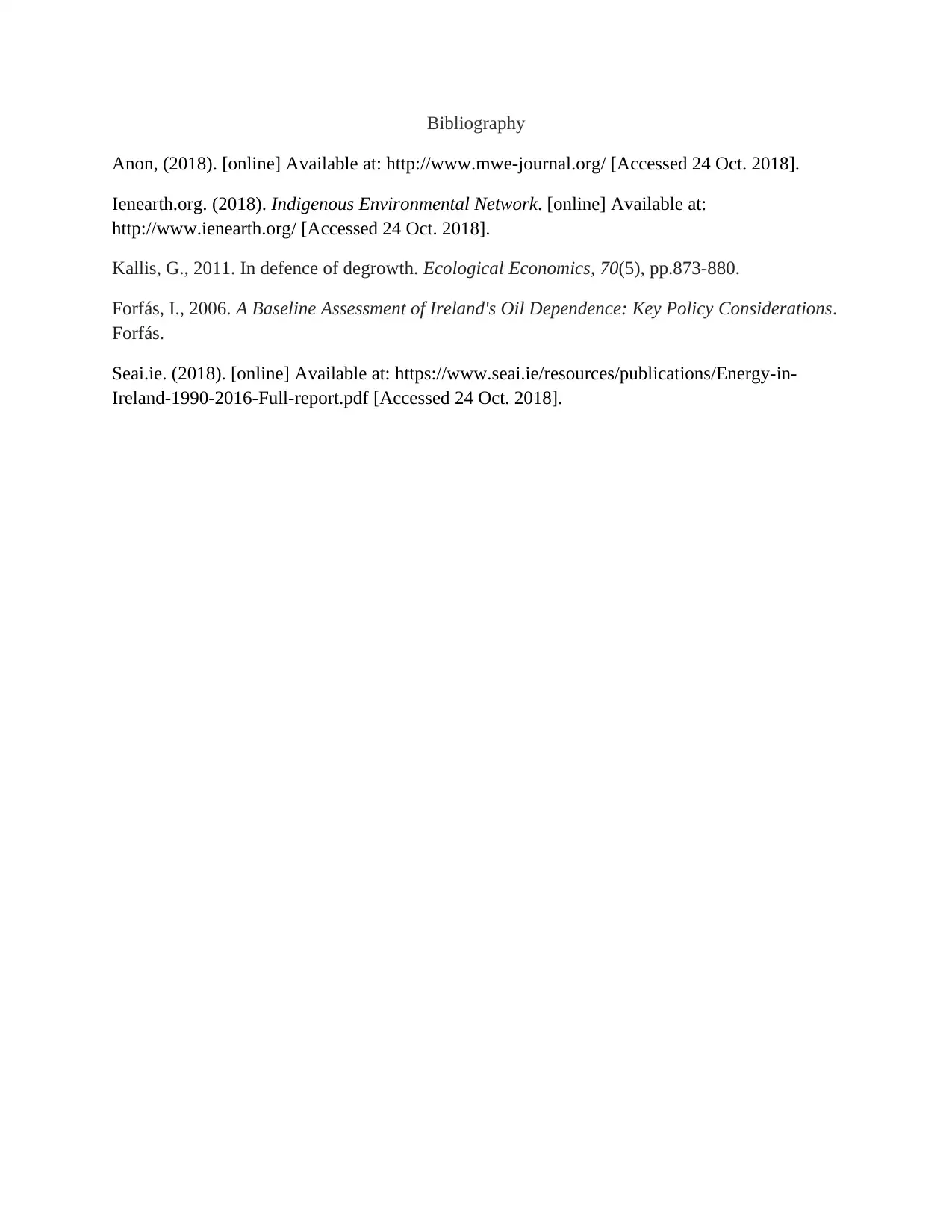
Bibliography
Anon, (2018). [online] Available at: http://www.mwe-journal.org/ [Accessed 24 Oct. 2018].
Ienearth.org. (2018). Indigenous Environmental Network. [online] Available at:
http://www.ienearth.org/ [Accessed 24 Oct. 2018].
Kallis, G., 2011. In defence of degrowth. Ecological Economics, 70(5), pp.873-880.
Forfás, I., 2006. A Baseline Assessment of Ireland's Oil Dependence: Key Policy Considerations.
Forfás.
Seai.ie. (2018). [online] Available at: https://www.seai.ie/resources/publications/Energy-in-
Ireland-1990-2016-Full-report.pdf [Accessed 24 Oct. 2018].
Anon, (2018). [online] Available at: http://www.mwe-journal.org/ [Accessed 24 Oct. 2018].
Ienearth.org. (2018). Indigenous Environmental Network. [online] Available at:
http://www.ienearth.org/ [Accessed 24 Oct. 2018].
Kallis, G., 2011. In defence of degrowth. Ecological Economics, 70(5), pp.873-880.
Forfás, I., 2006. A Baseline Assessment of Ireland's Oil Dependence: Key Policy Considerations.
Forfás.
Seai.ie. (2018). [online] Available at: https://www.seai.ie/resources/publications/Energy-in-
Ireland-1990-2016-Full-report.pdf [Accessed 24 Oct. 2018].
1 out of 5
Related Documents
Your All-in-One AI-Powered Toolkit for Academic Success.
+13062052269
info@desklib.com
Available 24*7 on WhatsApp / Email
![[object Object]](/_next/static/media/star-bottom.7253800d.svg)
Unlock your academic potential
Copyright © 2020–2026 A2Z Services. All Rights Reserved. Developed and managed by ZUCOL.





